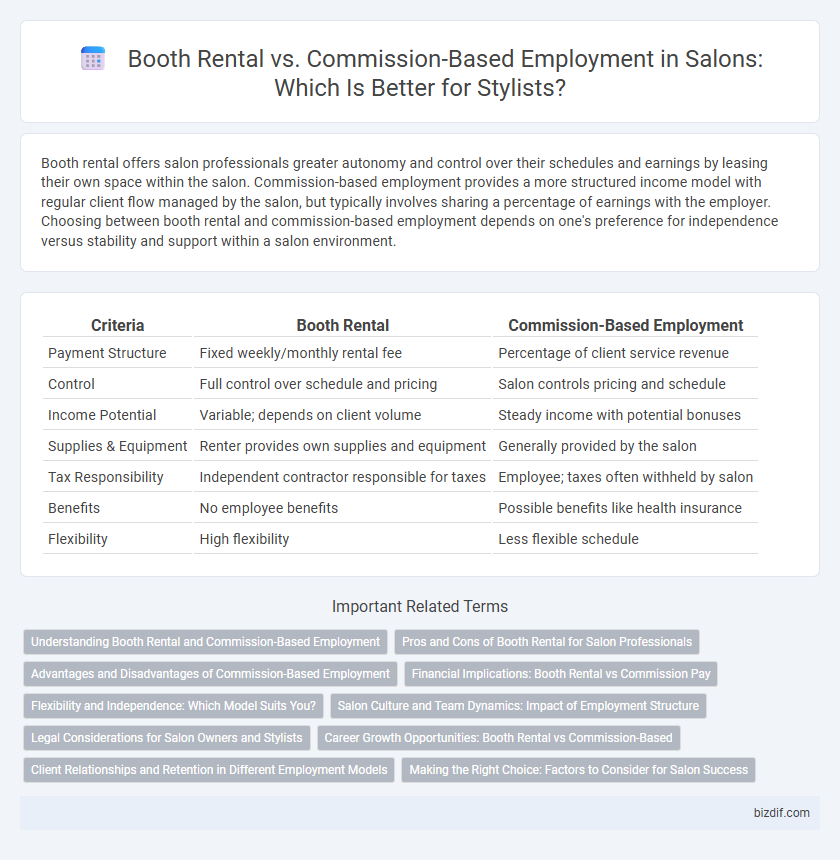Booth rental offers salon professionals greater autonomy and control over their schedules and earnings by leasing their own space within the salon. Commission-based employment provides a more structured income model with regular client flow managed by the salon, but typically involves sharing a percentage of earnings with the employer. Choosing between booth rental and commission-based employment depends on one's preference for independence versus stability and support within a salon environment.
Table of Comparison
| Criteria | Booth Rental | Commission-Based Employment |
|---|---|---|
| Payment Structure | Fixed weekly/monthly rental fee | Percentage of client service revenue |
| Control | Full control over schedule and pricing | Salon controls pricing and schedule |
| Income Potential | Variable; depends on client volume | Steady income with potential bonuses |
| Supplies & Equipment | Renter provides own supplies and equipment | Generally provided by the salon |
| Tax Responsibility | Independent contractor responsible for taxes | Employee; taxes often withheld by salon |
| Benefits | No employee benefits | Possible benefits like health insurance |
| Flexibility | High flexibility | Less flexible schedule |
Understanding Booth Rental and Commission-Based Employment
Booth rental in a salon typically involves hairstylists or beauty professionals leasing a designated space and retaining 100% of their service earnings while managing their own taxes, supplies, and schedules. Commission-based employment means salon workers receive a percentage of their service fees as income, with the salon covering costs like supplies, marketing, and booking, often including employee benefits. Understanding these models helps professionals weigh independence and financial responsibility against the support and structured environment offered by salons.
Pros and Cons of Booth Rental for Salon Professionals
Booth rental offers salon professionals greater autonomy, enabling them to set their own schedules and retain 100% of their earnings, which appeals to experienced stylists seeking independence. However, it requires managing all business expenses such as supplies, taxes, and marketing, potentially increasing financial risk and administrative workload. This model suits entrepreneurs comfortable with self-management but may lack the support and steady income provided by commission-based employment.
Advantages and Disadvantages of Commission-Based Employment
Commission-based employment in salons offers stylists a steady paycheck along with potential bonuses tied to performance, providing financial stability and motivation to increase sales and client retention. However, this model may limit stylist autonomy compared to booth rental, as employers typically control scheduling, product use, and pricing, which can restrict creative freedom and entrepreneurial growth. Dependency on employer policies and commission rates might reduce overall income potential, especially during slower business periods or when commissions are set low.
Financial Implications: Booth Rental vs Commission Pay
Booth rental offers salon professionals a fixed monthly expense, allowing them to retain 100% of their service revenue but requiring careful management of overhead costs. Commission-based employment provides a steady income through a percentage of each service performed, often accompanied by salon-provided supplies and marketing support, reducing financial risk. Understanding the trade-offs between predictable expenses and variable income is crucial for maximizing profitability in salon career choices.
Flexibility and Independence: Which Model Suits You?
Booth rental offers salon professionals greater flexibility and independence by allowing them to set their own schedules, control pricing, and manage their client base without manager oversight. Commission-based employment provides structured hours and consistent income, though stylists must adhere to salon policies and share a percentage of their earnings. Choosing between booth rental and commission employment depends on your preference for autonomy versus financial stability within the salon industry.
Salon Culture and Team Dynamics: Impact of Employment Structure
Booth rental fosters entrepreneurial independence, allowing stylists to cultivate personal client relationships while maintaining control over their schedules and branding, which can enhance motivation but may reduce collaborative opportunities. Commission-based employment promotes a unified salon culture through shared goals and team-driven incentives, encouraging cooperation, mentorship, and consistent service standards. The choice between these structures significantly shapes team dynamics, influencing both individual accountability and collective salon identity.
Legal Considerations for Salon Owners and Stylists
Salon owners must navigate legal considerations carefully when choosing between booth rental and commission-based employment models to ensure compliance with labor laws and tax regulations. Booth rental agreements classify stylists as independent contractors, requiring clear contracts that define responsibilities, liability, and tax obligations, while commission-based employees necessitate adherence to wage laws, benefits, and workers' compensation requirements. Proper legal structuring minimizes risks of misclassification lawsuits and fosters transparent, compliant business operations for both salon owners and stylists.
Career Growth Opportunities: Booth Rental vs Commission-Based
Booth rental in salons offers stylists full control over their business, fostering entrepreneurial skills and potential for higher income growth through client retention. Commission-based employment provides structured career advancement with consistent support, training, and access to employer resources, facilitating skill development and networking opportunities. Stylists seeking autonomy may prefer booth rental, while those valuing mentorship and predictable earnings often choose commission-based roles for long-term career growth.
Client Relationships and Retention in Different Employment Models
Booth rental allows stylists to build independent client relationships, fostering personal brand loyalty and increased retention through direct communication and customized service. Commission-based employment models often involve shared client bases managed by salon policies, which can both support retention via salon marketing efforts and limit individual stylist control over client interactions. Stylists in booth rental settings typically experience higher client retention rates due to greater autonomy in scheduling and personalized customer engagement strategies.
Making the Right Choice: Factors to Consider for Salon Success
Choosing between booth rental and commission-based employment in a salon hinges on factors such as financial stability, client base, and professional autonomy. Booth rental offers greater control over scheduling and income but requires managing all business aspects, while commission-based roles provide steady pay and support with less risk but limit entrepreneurial freedom. Evaluating personal goals, risk tolerance, and desired work environment is essential for sustained salon success.
Booth Rental vs Commission-Based Employment Infographic

 bizdif.com
bizdif.com